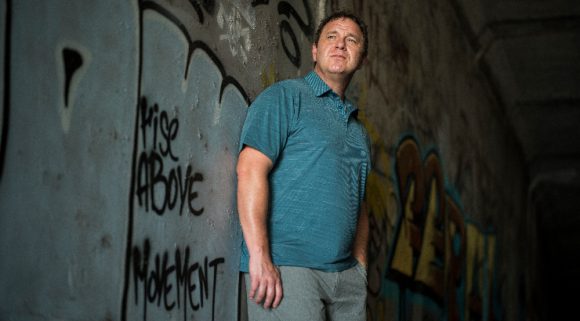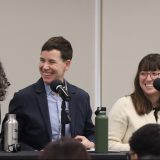
Studying Threats Targeting Public Officials Dr. Pete Simi Awarded an Additional $211,074 to Continue Research
September 19, 2023
 For his research on extremism and white supremacy, Dr. Pete Simi (Sociology) was awarded a $211,074 one-year grant from the University of Nebraska Omaha’s National Counterterrorism Innovation, Technology, and Education Center (NCITE), the Department of Homeland Security’s (DHS) Center of Excellence. Simi has received four NCITE grants totaling over $811,000 to support two large-scale multi-year projects on barriers to family suspicious activity reporting and threats to elected officials.
For his research on extremism and white supremacy, Dr. Pete Simi (Sociology) was awarded a $211,074 one-year grant from the University of Nebraska Omaha’s National Counterterrorism Innovation, Technology, and Education Center (NCITE), the Department of Homeland Security’s (DHS) Center of Excellence. Simi has received four NCITE grants totaling over $811,000 to support two large-scale multi-year projects on barriers to family suspicious activity reporting and threats to elected officials.
The NCITE consortium takes an interdisciplinary approach to solving homeland security challenges and includes more than 50 researchers from 19 different institutions. This grant supports opportunities for student researchers to work on this project alongside Dr. Simi, giving them tangible hands-on experience collecting and analyzing data highly relevant to the careers they are planning in the legal, intelligence, and academic research fields.
In year one (2022-23) of the “Understanding Threats to Public Officials” project, Simi and his research team began to examine threats directed to public officials represented in the following sectors: election/elected; education; healthcare; and law enforcement/military. To date, all relevant cases involving federal charges that fit these parameters from 2013 to 2023 have been archived with links to associated court documents. The team is currently coding these cases and has disseminated preliminary results as part of an infographic distributed by NCITE. These plain-language briefs and infographic summaries can be used to help intelligence analysts and policymakers understand their relative frequency, the types of officials being targeted, the nature of the threats themselves, and how to best respond.
“We have this phenomenon in America where we think we know what free speech is, but we really don’t,” said research assistant Marisa Quezada (Sociology ‘22). “You’re inciting violence – that’s not something that’s covered under free speech. And to threaten a federal official, that’s a federal crime.”
During the 2023-24 academic year, Simi and his research team will continue to focus on threats to public officials from 2013 to 2023. These threats are increasingly recognized as a growing problem requiring an effective counterterrorism response. This study helps inform that response by developing a comprehensive understanding of the patterns and trends related to communicated threats targeting public officials across the four primary sectors previously mentioned.
Simi’s team will also conduct a state-of-science review to assess existing survey studies focused on estimating the portion of the US population who support political violence. The new task will provide a much-needed assessment of what existing studies tell us about the level of public support for political violence. The state-of-science review will emphasize existing studies’ conceptual and methodological strengths and weaknesses and provide the basis for developing testable hypotheses. Assessing the current prevalence of public support for political violence is a necessary first step toward the primary goal, which involves a more specific understanding of the triggers and catalysts related to public support for political violence.
In contrast to scholarly literature reviews, state-of-science reviews extend beyond summarization and systematically analyze each study’s methods and results. This task will be led by Dr. Simi and fellow Chapman University Sociology Professor Chris Bader, an expert in survey methodology who relies on nationally representative survey samples to study US religious beliefs. The results from the state-of-science review will be presented as a table and narrative highlighting the most salient findings.
Simi is a nationally recognized political violence and extremism expert, and lawyers relied on Simi’s expert testimony during a Colorado trial that centers on whether Trump should be disqualified from running for president in the state, citing the 14th Amendment of the Constitution. In his testimony, Simi “argued that Trump cultivated a far-right following for years even before running for president, creating a relationship he took advantage of in his attempts to overturn his 2020 election loss. He said he was ‘very confident’ that Trump led the events of Jan. 6. ‘From my years of studying how far-right extremists perceive communication, the relationship that they developed with Donald Trump over multiple years, the various signals … promoting or endorsing violence, things done over social media … that aligned with many of the things that Trump said over the years,’ Simi said. ‘That relationship that was established and built, I think, really underscores how much influence he has for far-right extremists, and how much they perceive him as essentially one on their side or one of them,’ he continued.” Read more of Simi’s expert testimony in The Hill article, “Trump signaled to extremist groups on Jan. 6, experts testify in Colorado 14th Amendment case.”

